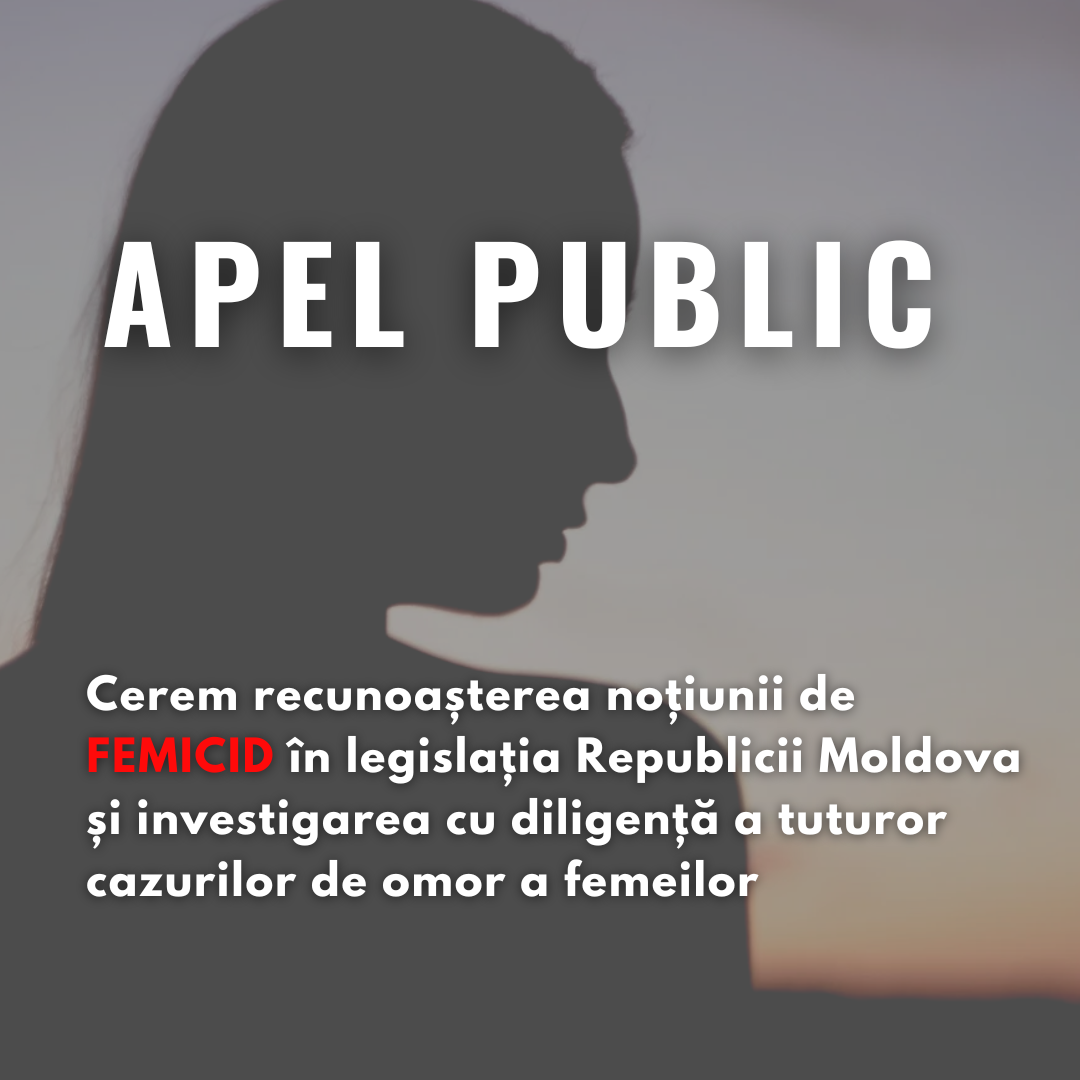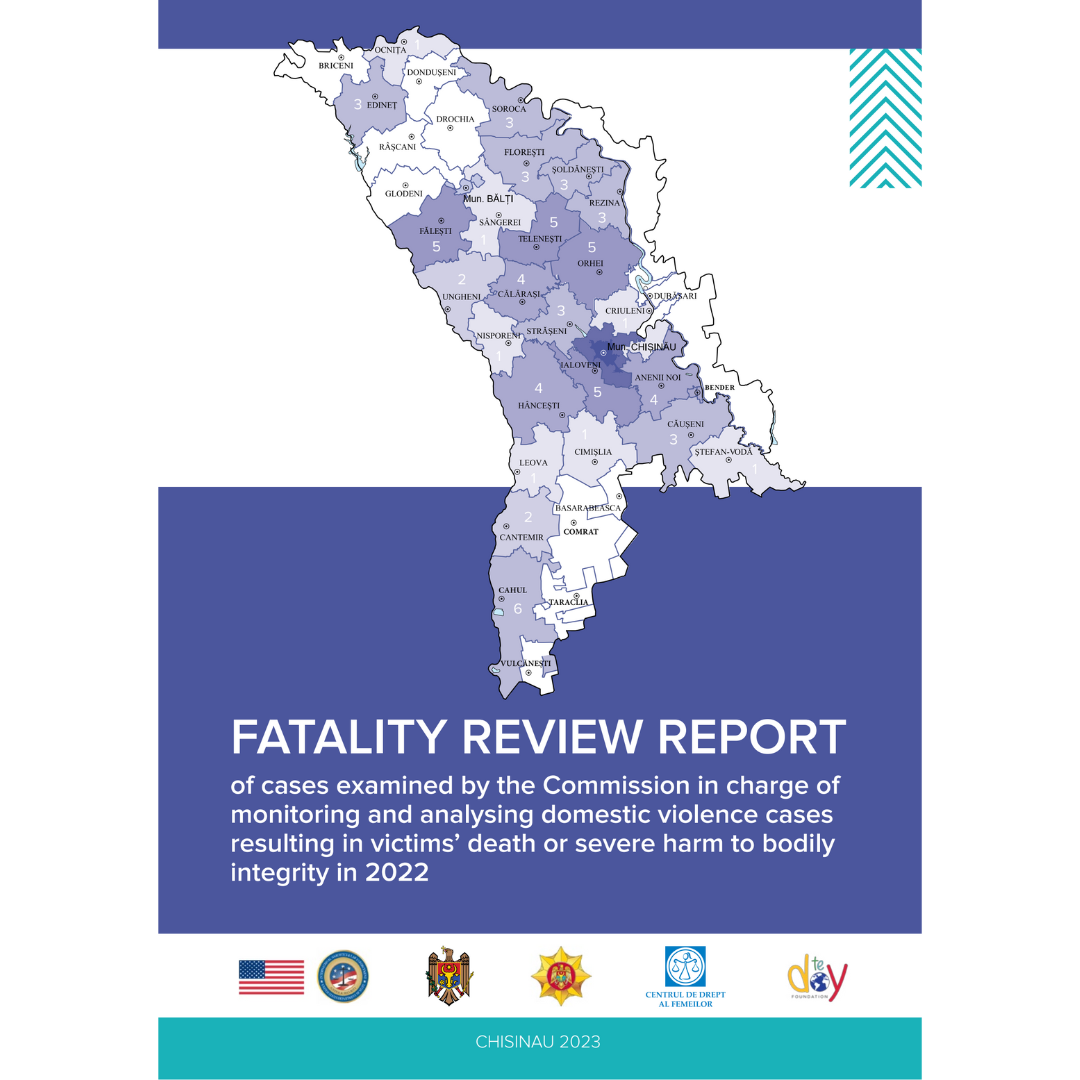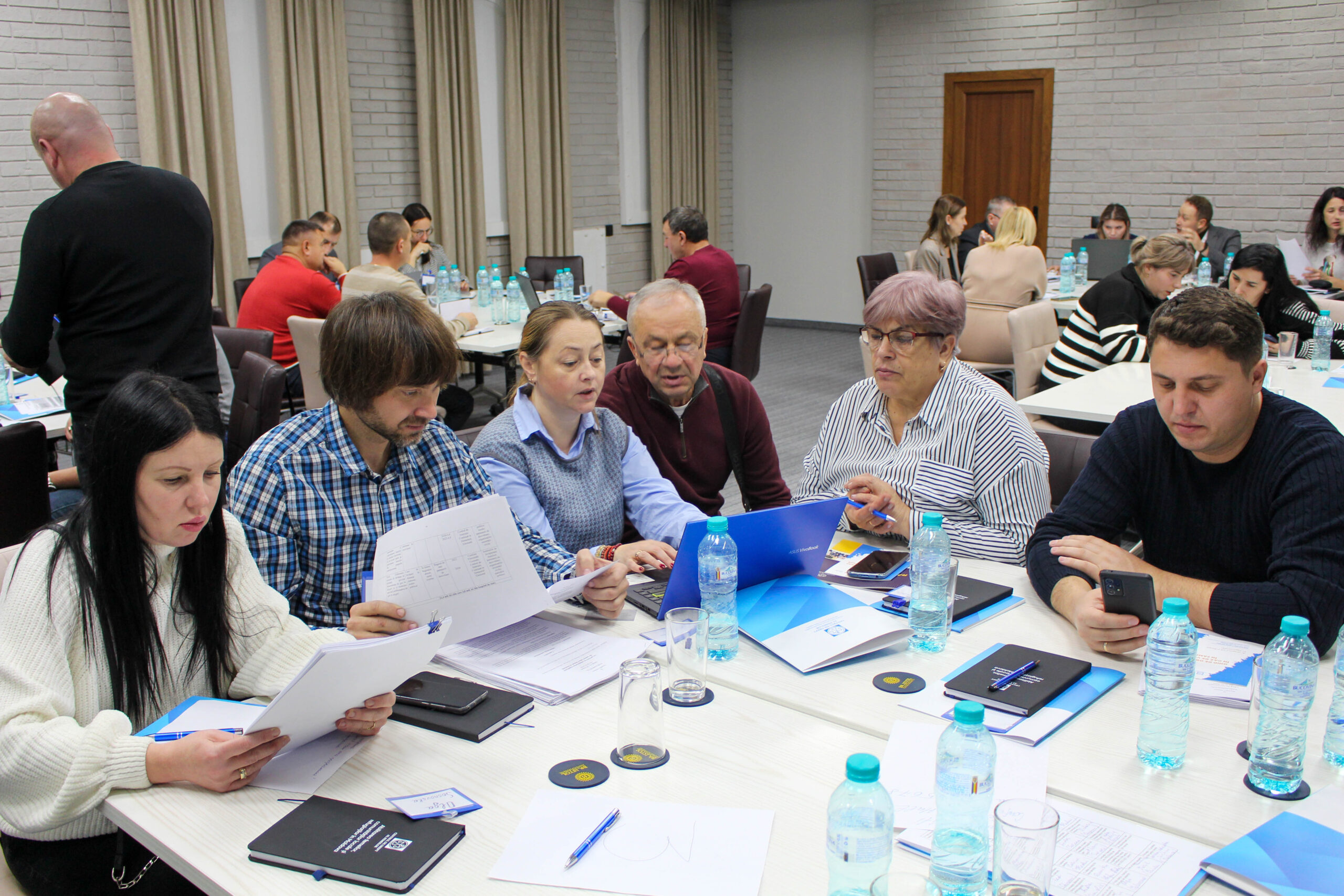Public Appeal: We demand that “femicide” is recognised in the legislation of the Republic of Moldova and all cases of murdered women are investigated thoroughly
Chișinău, 29 April 2024
Join our public appeal. Sign the petition here.
Background: The cruel murder of Ana-Maria, a young pregnant woman from Orhei, by a man in April 2024 shocked society. Two innocent lives were taken away. It is a gender-based murder, a woman is killed by a man after he rapes and tortures her.
What happened to Ana-Maria is the tragedy of dozens of women who are killed every year in Moldova. These cases also have a name – FEMICIDE. Unfortunately, it took another tragedy for us to speak out about this phenomenon and for the authorities to take action. This case fits perfectly into the culture of normalising and justifying violence against women in our society. Ana-Maria’s case clearly shows how girls and women are still unprotected in the Republic of Moldova, despite the efforts to adjust the legal framework and implement the relevant international treaties, in particular the Istanbul Convention in force for the Republic of Moldova as of May 2022.
Femicide is defined as the killing of a woman or a girl because of her gender and can take different forms: killing of a women as a result of intimate partner violence, torture and the misogynistic killing of women. According UNODC’s International Classification of Crime, “femicide” is the intentional killing of a woman for misogynistic or gender-based reasons. The UN Vienna Declaration on Femicide[1], reveals that “femicide is expressed in the killing of killing of a woman or girl because of her gender”, which can take the following types: 1) murder as a result of domestic violence/intimate partner violence; 2) torture and misogynistic slaying of women; 3) killing of women in the name of honour; 4) targeted killing of women in the context of armed conflict; 5) dowry-related killing of women; 6) killing of women because of their sexual orientation and gender identity; 7) killing of aboriginal and indigenous women and girls because of their gender; 8) female infanticide and foeticide (gender-based sex selection); 9) genital mutilation-related deaths; 10) accusations of witchcraft; 11) other types of femicide connected with organised crime, drugs, human trafficking and the proliferation of small arms.
However, the United Nations Office on Drugs and Crime (UNODC) points out that the intentional killing of female victims by intimate partners or family members is the most common form of femicide. According to data from the Global Study on Homicide (UNODC, 2020), domestic homicides affect both sexes. However, the share of women killed by intimate partners or other family members is much higher – aprox. 6 in 10. Home remains the most dangerous place for women who continue to bear the burden of this phenomenon, becoming victims and even losing their lives as a result of gender inequality and stereotypes. The killing of women and girls by intimate partners or other family members, those they would normally be expected to trust, is one of the most extreme display of gender-based violence. Such crimes are often the culmination of previous experiences of gender-based violence which can include psychological, spiritual, sexual and physical violence.
According to the same study (UNODC, 2020), it is vital to recognise that women are often victims of violence not only in the private life, but also in a wider variety of contexts. This highlights the need for comprehensive protection measures for women that go beyond the prevention of domestic violence to include protection against all forms of assault committed by family members or from other sources. It is crucial to address the inequality and gender stereotypes that contribute to this phenomenon, ensuring that the protection offered to women covers all environments where they may be vulnerable to violence. It is therefore necessary to extend legislation and implement effective programs to protect women in a wide range of situations, reaffirming society’s commitment to fight gender-based violence in all its forms.
The estimates from 2022 show that over 89,000 women were killed for gender-related reasons, of which 48,800 by their intimate partner or other family members, with 2,600 in Europe alone.[2] The number of victims is thus much higher, as orphaned children, bereaved parents, brothers and sisters are rarely considered as direct victims. Gaps in the law regarding the legal framework of femicide restrict their access to justice, leaving family members of femicide victims neglected. In fact, the lack of a comprehensive response to femicide not only prevents the effective prevention and prosecution of these crimes, but essentially deprives surviving victims of the necessary support and exposes them to repeated victimisation during the criminal justice process.
In the Republic of Moldova, in order to monitor the cases of domestic violence resulting in the death of victims, in 2021 the Women’s Law Centre conducted the first National Study for Analysing the Deaths of Victims of Domestic Violence for 2016-2019. According to the data provided, 65 women were killed in the Republic of Moldova in 2016-2019 due to lack of a coordinated response and access to specialised services for women with multiple vulnerabilities. The Women’s Law Centre has advocated for establishing an institutional mechanism to analyse cases resulting in death or serious bodily injury following domestic violence offences, for the first time raising the issue of recognition of “femicide” in national legislation.
We note as a positive development the fact that in February 2022, by joint Order of the Ministry of Internal Affairs, Ministry of Justice, Prosecutor General’s Office, Ministry of Health, Ministry of Labour and Social Protection, Ministry of Education and Research, the mechanism for monitoring and analysing cases of domestic violence resulting in death or serious injury to the victims was established.[3] To implement this mechanism, the Commission in charge of monitoring and analysing domestic violence cases resulting in victims’ death or severe harm to bodily integrity of victims was established. Please note that the Commission only examines cases of murder of women committed by an intimate partner or family member.
In 2022, the first Report for analysing domestic violence cases resulting in victims’ death or severe harm to bodily integrity of victims[4] was produced, which found 24 female victims of femicide, 45 women with serious injury, while in 2023, 21 women were killed and 37 women were seriously injured.
We note that although there has been a positive development following the establishment of the above-mentioned Multisectoral Commission in charge of monitoring and analysis under the aegis of the Ministry of Internal Affairs and the annual drafting of analysis reports on cases of domestic violence resulting in death or serious bodily injury based on a complex methodology, with annual recommendations being made, including the introduction by the Ministry of Internal Affairs of a lethality questionnaire for the police under Order No 93 approving the Methodical Instruction on Police Intervention in Preventing and Combating Domestic Violence of 23 March 2023, we consider that it is necessary to intensify the efforts of all relevant institutions and authorities,
Given the need to raise awareness that violent deaths of women and girls is a crime that should not be confused with the term of homicide,
Being aware that femicide differs from other crimes based on the following criteria: (i) in most cases, acts of femicide are committed by current or former life partners; (ii) acts of femicide are preceded by ongoing domestic violence, threats or intimidation, sexual violence; (iii) acts of femicide are characterised by the unequal balance of power and resources of the victims and their partners.
Bearing in mind that the Council of Europe Convention on preventing and combating violence against women and domestic violence,[5] defines violation of human rights and a form of discrimination against women and shall mean all acts of gender-based violence that result in, or are likely to result in, physical, sexual, psychological or economic harm suffering to women, including threats of such acts, coercion or arbitrary deprivation of liberty, whether occurring in public or in private life;
Bearing in mind that the new EU Directive of the European Parliament and of the Council of the EU on combating violence against women and domestic violence adopted on 24 April 2024,[6] defines violence against women as femicide, rape, sexual harassment, sexual abuse, stalking, early marriage, forced abortion, forced sterilisation and different forms of cyber violence, such as online sexual harassment and cyber bullying
Given that in the Republic of Moldova, the term femicide is not recognised officially, although the Women’s Law Centre has been advocating for a long time for the recognition of femicide in national legislation and practice. Today more than ever, it is necessary to recognise that the violent death of women and girls is a crime that should not be confused with the term homicide.
CALL TO ACTION
- 1. We ask the criminal justice system of the Republic of Moldova to investigate with due diligence the case of the murder of Ana-Maria and to punish the perpetrator accordingly, with the maximum custodial punishment and the aggravating circumstances provided for by the Criminal Code, according to Article 145(2) of the Republic of Moldova.
- 2. We ask the Parliament of the Republic of Moldova to recognise the concept of “femicide” in the legislation and to introduce in the Criminal Code the aggravating circumstances for crimes of femicide and other gender bias crimes.
- 3. We ask the Parliament of the Republic of Moldova to revise the Criminal Code by establishing the mandatory application of additional punishment in cases of gender bias crimes, which would involve deprivation of educational, social activities.
- 4. We call on the Moldovan Parliament to revise Article 90(6) of the Criminal Code to extend the range of obligations imposed on persons released on parole, including the prohibition of the use of alcohol, drugs or other prohibited substances and imposing control measures such as detoxification or treatment.
- 5. We ask the Government of the Republic of Moldova to set up a working group on introducing the concept of “femicide” in the legislation and in the Criminal Code, on the platform of the Commission in charge of monitoring and analysing domestic violence cases resulting in victims’ death or severe harm to bodily integrity, by October 2024, and to submit legislative proposals for approval by Parliament.
- 6. We ask the Government of the Republic of Moldova to extend the mandate of the Commission in charge of monitoring and analysing domestic violence cases resulting in victims’ death or severe harm to bodily integrity to include cases resulting in death of female victims as a result of gender biased crimes, where the perpetrator and victim are not family members within the meaning of Art. 1331 of the Criminal Code or had a relationship similar to the relationship between partners.
- 7. We request the Commission in charge of monitoring and analysing domestic violence cases resulting in victims’ death or severe harm to bodily integrity, on the basis of the recommendations of the Annual Report of the Commission in charge of monitoring and analysing domestic violence cases resulting in victims’ death or severe harm to bodily integrity of victims, to draw up an Annual Action Plan with deadlines for implementation of the recommendations and result indicators. Develop a mechanism to assess and monitor progress based on the Annual Action Plan.
- 8. We call on the criminal justice system to ensure a prompt response to all cases of violence against women by creating specialised units within the Prosecutor’s Office and the MIA.. Mandatory risk assessment in all cases of violence against women. Holding perpetrators accountable, adopting proportionate and dissuasive sentences.
- 9. We request the state authorities to take concrete measures and actively engage in the prevention of all cases of femicide and violence against women in general.
- 10. We request the justice system to encourage the judicial practice of requiring state prosecutors, in the case of conditional suspension of punishment for domestic violence/sexual violence, to require the perpetrator to attend a special treatment or counselling program to reduce violent behaviour or to attend treatment in the case of alcoholism or drug addiction.
- 11. We request the probation system to develop aggression reduction programs, including recovery programs, focused on alcohol, drug and other narcotic and psychotropic substance use/dependence, for persons on probation and/or released from detention at the end of their term.
- 12. We request the prison system to assess the existing correctional program for people convicted of domestic violence/sexual violence and the development of skills development activities for prison staff to deliver interventions specific to the needs of prisoners.
- 13. We request the state authorities to provide mandatory training for the criminal justice chain on responding to high-risk cases of lethality/femicide, gender identification in cases of violence against women and awareness-raising on victim-centred intervention.
- 14. We call for the recognition of the rights of family members affected by femicide. Providing full information on victims’ rights in criminal proceedings, ensuring a victim-centred approach, including by guaranteeing access to witness protection measures, especially for children.
- 15. We call for a systematic analysis of femicide cases by collecting quantitative and qualitative data on the killing of women and their children with the participation of non-governmental organisations and academia.
- 16. We call for the development of programs so that the successors of femicide victims receive full compensation from the state for the material and moral damage caused by the crime.
- 17. We call for ensuring that the successors of femicide victims have access to specialised support to overcome psychological trauma for as long as necessary.
Signatories:
- 1. Women’s Law Centre
- 2. National Coalition “Life without Violence” (27 NGOs and public institutions)
- 3. Gender Equality Platform (51 NGOs)
- 4. Coalition for Inclusion and Non-discrimination (23 members)
- 5. “La Strada” International Centre
- 6. National Center for Child Abuse Prevention
- 7. ”Casa Mărioarei” NGO
- 8. “Women for Women” NGO
- 9. ”Artemida” NGO
- 10. ”Ophelia” NGO
- 11. RCTV Memoria
- 12. “Резонанс” Centre, Tiraspol
- 13. “National Centre for Training, Assistance, Counselling and Education in Moldova” NGO
- 14. ”PRODOCS” NGO
- 15. ”Help” NGO
- 16. ”Interactiune” NGO
- 17. Soros Foundation-Moldova
- 18. ”Ave copiii” NGO
- 19. Association of Women for Contemporary Society.
- 20. Human Rights Association Lex XXI
- 21. East European Foundation
- 22. “Child Community Family” Moldova
- 23. “Crime Prevention Fund” NGO
- 24. “Union for Equity and Health” NGO
- 25. “Biaz Gul” NGO, Comrat
- 26. Law Center of Advocates
- 27. National Association of Paralegals of Moldova
- 28. Pediatric Society of the Republic of Moldova
- 29. Elena Rățoi
- 30. 50/50 Women’s Political Club
- 31. ”PRODOCS” NGO
- 32. ”Ave copiii” NGO
- 33. Soros Foundation-Moldova
- 34. “Стимул” NGO
- 35. Institute for Family and Social Initiatives NGO
- 36. Promo-LEX Association
- 37. Gender-Centre
- 38. Center for Health and Community Development AFI: Act for Involvement
- 39. Partnership for Development Centre
- 40. HelpAge Moldova
- 41. VIVERE Association of Young People with Disabilities
- 42. Office of the People’s Advocate
- 43. NGO ‘Child Rights Information and Documentation Centre”
Organisations from Romania:
- 1. . Network for the Prevention and Combating of Violence against Women in Romania (25 organisations)
- 2. Association for Gender Equality and Freedom – A.L.E.G.
- 3. The Romanian Mediation and Community Safety Centre Foundation
- 4. Romanian Women’s Lobby Association
The list is still open



